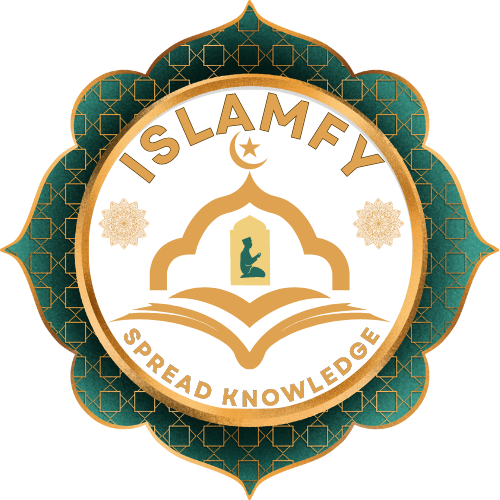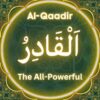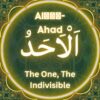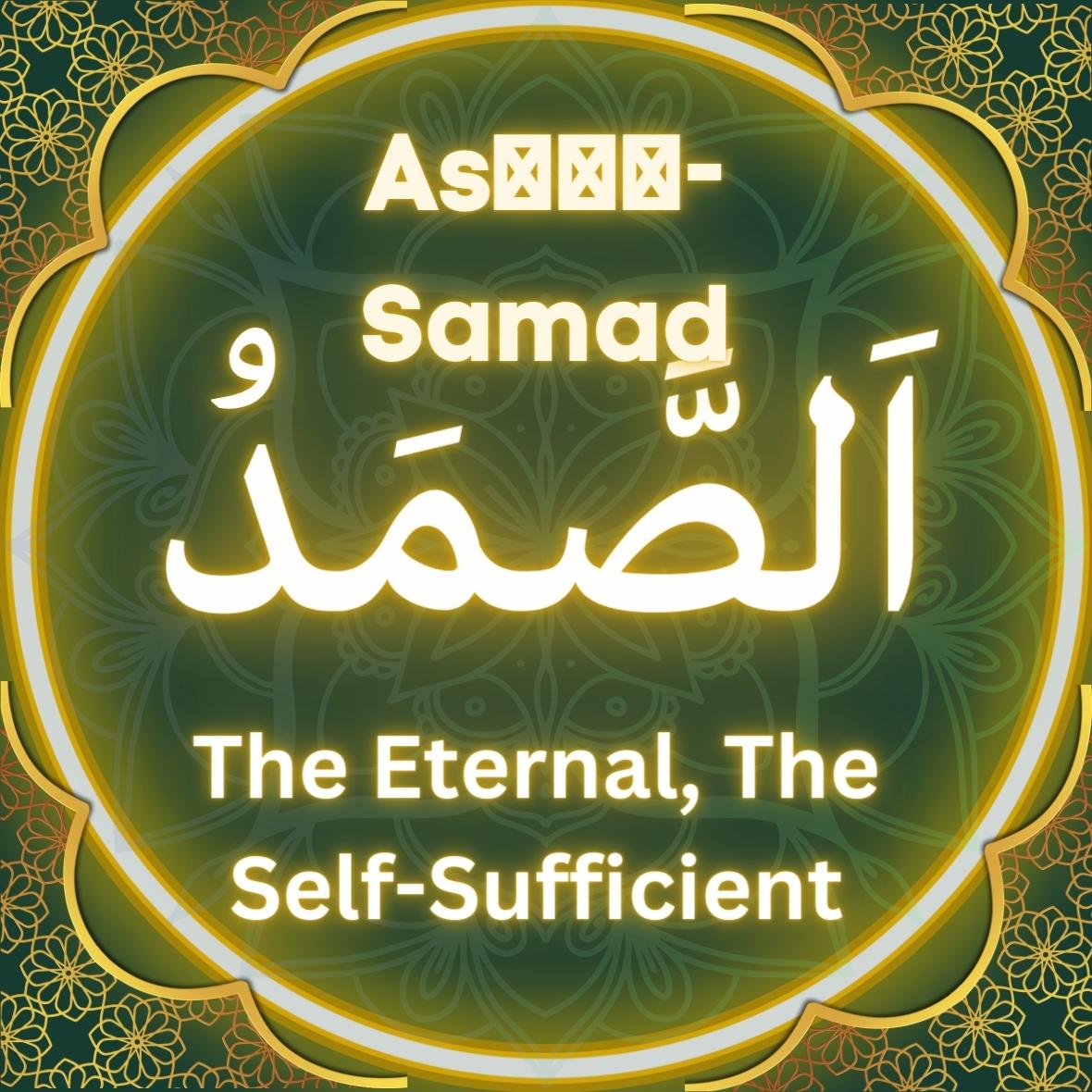Explanation
As-Samad (الصمد) — One of the most profound and encompassing names of ALLAH, As-Samad reflects His absolute perfection, independence, and the ultimate source of all support. This attribute is central to understanding the nature of ALLAH in Islam.
Meaning and Linguistic Roots
-
Literal Meaning:
The term As-Samad is derived from the Arabic root “صمد” (samada), which conveys the idea of being absolute, eternal, and completely self-sufficient. It means “the One on whom all of creation depends,” yet He Himself is free from any need or deficiency. -
Conceptual Implications:
- Absolute Self-Sufficiency: ALLAH is independent; everything in the universe relies on Him, but He relies on nothing.
- Ultimate Refuge: In every moment of need, all creatures turn to ALLAH, for He is the one who satisfies every requirement without ever being in need Himself.
Scholarly Interpretations and Insights
-
Classical Exegesis:
Islamic scholars like Ibn Kathir and Al-Tabari have elaborated on this attribute by emphasizing that while all of creation is in constant need of sustenance and support, ALLAH is the One who provides without ever experiencing need. His perfection is such that nothing in the universe can be compared to Him. -
Spiritual Reflection:
Understanding that ALLAH is As-Samad encourages believers to place complete trust in Him. It reminds us that our ultimate security and refuge lie in His hands, and that our worldly endeavors should be accompanied by a deep reliance on the One who is wholly sufficient.
Practical and Spiritual Lessons
-
Reliance on Allah:
Recognizing ALLAH as As-Samad teaches us to turn to Him in moments of hardship and need. Since every need is ultimately fulfilled by Him, believers are encouraged to seek solace and support through prayer and supplication. -
Humility and Gratitude:
When we acknowledge that we depend on a Being who is entirely self-sufficient, it fosters humility. We are reminded that our achievements and well-being are not solely due to our efforts but are sustained by the infinite grace of ALLAH. This realization nurtures gratitude and continuous remembrance. -
Self-Reflection:
The concept of As-Samad invites us to reflect on our own limitations and to understand the vast difference between the Creator and His creation. It encourages us to strive for spiritual growth by seeking to align our lives with the principles of dependence on ALLAH alone.
Final Reflections
The name As-Samad encapsulates the essence of ALLAH’s eternal, independent, and self-sufficient nature. It is a powerful reminder that while every aspect of creation depends on ALLAH for existence and sustenance, He is completely independent and free from any need. The mention of As-Samad in Surah al-Ikhlas not only affirms the uniqueness of Allah but also serves as a foundation for the believer’s trust, reliance, and humility before the Divine. Embracing this attribute helps deepen our faith, guiding us to seek refuge and support in the One who is the ultimate and eternal source of all life.
Quran References
The most direct reference to this attribute appears in Surah al-Ikhlas (Chapter 112), which is one of the most concise yet comprehensive chapters of the Qur’an.
Arabic:
قُلْ هُوَ اللَّهُ أَحَدٌ، اللَّهُ الصَّمَدُ
Translation:
“Say, ‘He is ALLAH, [who is] One, ALLAH, the Eternal Refuge (As-Samad).'”
Explanation:
In this verse, ALLAH introduces Himself as As-Samad, the Eternal Refuge. This name signifies that ALLAH is the One who is sought by all creation for their needs, yet He Himself is entirely independent and self-sufficient. He is the ultimate source of all fulfillment, protection, and sustenance. The verse emphasizes ALLAH’s absolute oneness and His unique nature, free from any dependency or limitation. It is a profound declaration of Tawhid (the Oneness of ALLAH) and a reminder that all creation relies on Him, while He relies on nothing and no one.
Indirect Quranic References Reflecting the Meaning of As-Samad
1. Surah Fatir (35:15)
Arabic:
يَا أَيُّهَا النَّاسُ أَنتُمُ الْفُقَرَاءُ إِلَى اللَّهِ ۖ وَاللَّهُ هُوَ الْغَنِيُّ الْحَمِيدُ
Translation:
“O mankind, you are those in need of ALLAH, while Allah is the Free of need, the Praiseworthy.”
Explanation:
This verse highlights the dependency of all creation on ALLAH and His absolute self-sufficiency. It reflects the meaning of As-Samad, as ALLAH is the One who fulfills the needs of His creation while being entirely independent of them. He is the source of all provision and praise, and His self-sufficiency is a key aspect of His divine nature.
2. Surah Al-Baqarah (2:255) – Ayat al-Kursi
Arabic:
اللَّهُ لَا إِلَٰهَ إِلَّا هُوَ الْحَيُّ الْقَيُّومُ ۚ لَا تَأْخُذُهُ سِنَةٌ وَلَا نَوْمٌ ۚ لَّهُ مَا فِي السَّمَاوَاتِ وَمَا فِي الْأَرْضِ ۗ مَن ذَا الَّذِي يَشْفَعُ عِندَهُ إِلَّا بِإِذْنِهِ ۚ يَعْلَمُ مَا بَيْنَ أَيْدِيهِمْ وَمَا خَلْفَهُمْ ۖ وَلَا يُحِيطُونَ بِشَيْءٍ مِّنْ عِلْمِهِ إِلَّا بِمَا شَاءَ ۚ وَسِعَ كُرْسِيُّهُ السَّمَاوَاتِ وَالْأَرْضَ ۖ وَلَا يَئُودُهُ حِفْظُهُمَا ۚ وَهُوَ الْعَلِيُّ الْعَظِيمُ
Translation:
“ALLAH! There is no deity except Him, the Ever-Living, the Sustainer of existence. Neither drowsiness overtakes Him nor sleep. To Him belongs whatever is in the heavens and whatever is on the earth. Who is it that can intercede with Him except by His permission? He knows what is before them and what will be after them, and they encompass not a thing of His knowledge except for what He wills. His Kursi (Throne) extends over the heavens and the earth, and their preservation tires Him not. And He is the Most High, the Most Great.”
Explanation:
This verse, known as Ayat al-Kursi, beautifully encapsulates the attributes of ALLAH that align with As-Samad. ALLAH is described as the Ever-Living, the Sustainer of all existence, and the One who is entirely self-sufficient. He is the ultimate authority and protector, and His knowledge and power encompass everything. This verse reinforces the concept of Allah being the Eternal Refuge, the One who is sought for all needs and who sustains all creation without any fatigue or dependency.
3. Surah Al-Hadid (57:3)
Arabic:
هُوَ الْأَوَّلُ وَالْآخِرُ وَالظَّاهِرُ وَالْبَاطِنُ ۖ وَهُوَ بِكُلِّ شَيْءٍ عَلِيمٌ
Translation:
“He is the First and the Last, the Ascendant and the Intimate, and He is, of all things, Knowing.”
Explanation:
This verse describes ALLAH’s eternal and all-encompassing nature. As As-Samad, Allah is the First and the Last, meaning He is eternal and unchanging. He is the Ascendant (above all creation) and the Intimate (closer to us than our jugular vein). This duality reflects His self-sufficiency and His role as the ultimate refuge for all creation. His knowledge encompasses everything, further emphasizing His perfection and completeness.
4. Surah Al-An’am (6:102)
Arabic:
ذَٰلِكُمُ اللَّهُ رَبُّكُمْ ۖ لَا إِلَٰهَ إِلَّا هُوَ ۖ خَالِقُ كُلِّ شَيْءٍ فَاعْبُدُوهُ ۚ وَهُوَ عَلَىٰ كُلِّ شَيْءٍ وَكِيلٌ
Translation:
“That is ALLAH, your Lord; there is no deity except Him, the Creator of all things, so worship Him. And He is Disposer of all things.”
Explanation:
This verse emphasizes ALLAH’s role as the Creator and Sustainer of all things, which aligns with the meaning of As-Samad. He is the One who manages and disposes of all affairs, and He is the only One worthy of worship. His self-sufficiency and authority over all creation are central to His divine nature, making Him the Eternal Refuge for all beings.



